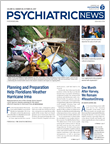As I sit at my dining room table and survey the ongoing “remodel” of my home, it has been exactly one month since Hurricane Harvey pummeled Houston. During the disaster, it was easy to feel helpless and lost, especially while worrying about friends and family and witnessing floodwaters that would not stop rising.
In the days immediately following Harvey, it was challenging to balance various roles—from first responder at the shelters, to checking on friends and family in the area, to being a survivor myself. A month later, many of us continue to rebuild our lives and strive to return to some level of normalcy. We are not alone in this, however; we have the overwhelming support of our local community and caring individuals from across the state and country.
Having never experienced a natural disaster of this magnitude, I have found this tragedy to be a huge learning experience as a survivor and a psychiatric trainee. I was impressed by the city’s ability to care for survivors, mostly through dedicated medical personnel and extensive planning, and to turn chaos into organization. Shelters were a “go” immediately, with the full-scale needs of survivors met early on. A medical model that included triage, physical health care, mental health care, and a pharmacy were up and working within hours with effective coordination and collaboration between the teams. An overwhelming number of volunteers arrived at the shelters including psychiatrists and trainees, even as many of them were grappling with their own problems involving their homes and businesses. The number of shelters continued to grow as more and more survivors needed help, as did the volunteer base.
The selflessness I witnessed cannot be adequately described; some individuals were able to get to the shelters to volunteer their services, while others rescued individuals from their homes in canoes, kayaks, and boats. As the floodwaters started to recede, we saw the true extent of the devastation. Entire homes and businesses were simply unsalvageable. In fact, as I sit here today, debris from thousands of homes and offices that sustained damage continues to litter the streets.
As a first responder, I would be remiss if I failed to mention feeling overwhelmed. I had both humbling and humorous experiences like having to explain that psychiatrists are medical doctors capable of providing all types of medical care. Many of us in training, and even practicing physicians, had to have a crash course in disaster medicine to help survivors dealing with grief, trauma, and loss. Seeing cot after cot lined up, many of which were holding an individual’s entire belongings, can put responders’ day-to-day stress in perspective. We witnessed the full range of human emotions—anger, sadness, fear, humility, and gratitude. Just being there to listen, offer support, and organize resources was often enough and was typically received as an act of grace and kindness.
Partisan and other kinds of division have become our daily national fare. But as has been demonstrated time and again when disaster strikes and the chips are down, Harvey showed us the spirit of human compassion and working together. Our first responders, shelter volunteers, and even survivors helping other survivors showed our immense commitment to help one another and our Texas toughness and resiliency. The flooding, devastation, and rebuilding after Hurricane Harvey will likely have repercussions for some time, but through it all, we will band together and remain #HoustonStrong. ■

